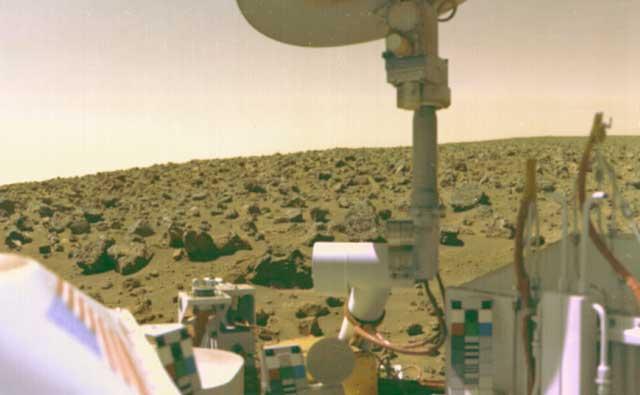July 12, 2018 – The Viking landers that reached Mars during the 200th anniversary of American independence conducted a number of experiments that clearly showed the presence of organic molecules on the planet’s surface. Airing on the side of caution, these results were questioned and in the final analysis at the time NASA stated Viking had not found organics. Now 42 years later with Curiosity discovering organic molecules, NASA is revisiting its Viking results and recognizing that the elements of life were very much in evidence back in those early 1976 experiments. In fact, Viking found the same chlorobenzenes that Curiosity unearthed. Of course, there remain a number of scientists who believe that any evidence of organics found on Mars was brought there from Earth by the landers and rovers themselves.
Revisiting the Viking experiments has become a repetitive process with NASA scientists. Both Vikings had on board a chemistry lab which could sample soil dug up by the landers trenching tools. In the Label Release Experiment, a diluted solution with added carbon compounds was added to each soil sample. The onboard then measured gases coming from the soil. The experiment was repeated this time with the soil sample heated to 160 Celsius (320 Fahrenheit) degrees. Again the gases emanating from the sample were measured. The experiments were duplicated on Earth using terrestrial soil samples with the results compared to what Viking produced.
Today a large number of scientists interpret the results of those Viking experiments as evidence to support that there has been in the past and is today active microbial life on Mars. They rate the certainty of this at 99%. And although no one in the NASA scientific community or at JPL Pasadena is shouting it out, there is no doubt that Curiosity’s confirmation of similar organics found at Gale Crater further validates this interpretation of the Viking experiments.
NASA remains overly cautious whenever the subject of life on Mars, both past and present comes up. That’s the public face the agency presents. But inside NASA there is an excitement about Mars that is driving interest in what will be discovered and confirmed when the Mars 2020 and European Space Agency ExoMars travel to the planet in 2020.
The latest paper published on the subject of organics found on Mars appears in the June 20, 2018 issue of the Journal of Geophysical Research. This peer-reviewed paper states that chlorobenzene, a chlorinated organic molecule that is a commonly used solvent here on Earth, was identified by both the Vikings and Curiosity, and is of Martian origin.
How does the confirmation of that discovery alter our approach to exploring and potentially colonizing Mars?
In our effort to find life elsewhere in the Universe, will we, in going to Mars, destroy the very evidence we seek? How will humans arriving on Mars not negatively impact an existing Martian microbial ecosystem? Is it in our plans to create refuges for Martian life as we begin to colonize the planet? The history of human exploration and our restless expansion to new lands has never been kind to the local flora and fauna. The mega extinctions in North America fauna that occurred when humans crossed from Asia tens of thousands of years ago is but one example. A second is the one when European explorers landed on North American shores leading to a pandemic that wiped out more than 90% of the continent’s native human population.
We need to “do no harm” when it comes to going to the Moon and Mars. It’s time to come up with a plan.










[…] search for evidence of past and present life on Mars continues. From the first Viking lander experiments that tantalized and teased us, to Perseverance’s latest discovery, we still don’t know […]